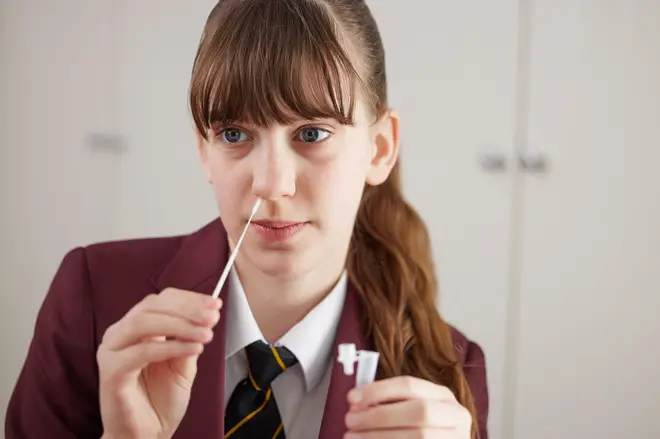
Clive Bull 1am - 4am
23 July 2021, 00:05 | Updated: 23 July 2021, 00:28

Daily testing of pupils who have been in contact with someone with Covid-19, rather than isolating whole groups, may be just as effective in controlling transmission in secondary schools, a study suggests.
Research by the University of Oxford looked at 200 English secondary schools and compared those that followed the national guidance of quarantining contacts of positive cases with those that allowed contacts to instead take daily lateral flow tests.
They found little difference between the rates of staff and students developing symptomatic Covid-19 – in fact, the researchers estimated that there were slightly fewer infections among pupils and staff when daily testing was used.
Read more: Govt reveals list of workers who can avoid self-isolation if told to quarantine
Read more: Record number of alerts sent to NHS Covid app users
"Our findings indicate that there is no significant difference in Covid-19 transmission between schools where bubbles were sent into home isolation versus those where daily contact testing was implemented instead,” said Tim Peto, professor of medicine at the University of Oxford and principal investigator on the study.
"Infection rates in the close contacts were low in general, and there was little difference between those who went to school following a negative lateral flow test and those who were isolating at home."
He advised policymakers to use the study to think about transmission in the workplace compared to schools - and whether employees in other workplaces would be "enthusiastic" about testing.

'It's not the app failing, it's because more people have Covid.'
The study, which was sponsored by the Department of Health and Social Care and supported by the Department for Education and Office for National Statistics, suggested that adopting a testing regime instead of isolation could reduce Covid-related school absences by 39 per cent.
The findings come after Government figures show that more than one million children in England were out of school last week for Covid-related reasons - the equivalent of around one in seven - with 934,000 children self-isolating due to a possible contact with a Covid-19 case.
Current rules say that children have to self-isolate for 10 days if another pupil in their bubble - which can be an entire year group - tests positive for Covid-19, although from August 16 children in England will only need to self-isolate if they have tested positive for Covid-19.

Union calls for proof removal of school Covid rules isn't political
Susan Hopkins, chief medical adviser for NHS Test and Trace, said: "This is a major breakthrough, showing that daily contact testing can keep young people in classrooms instead of making them isolate at home."
She added: "We've been trying to find safe alternatives, and this study gives us evidence of safe alternatives to isolation for school contacts.
"So far, self-isolation has been one of the most effective tools at our disposal against Covid-19 - stopping isolated cases from becoming major outbreaks. To have another potential tool like this is great news."
Read more: London hospitals warned there could be 1,500 coronavirus patients by mid-August
Read more: 'Pingdemic': Shoppers warned not to panic buy as some shelves lie empty
A Government spokesperson said: "Throughout the pandemic we have followed scientific and medical advice, putting in place protective measures such as self-isolation following contact with infection to keep our schools and wider communities safe, while prioritising students' attendance at school and college because of the benefits of face-to-face education for development and wellbeing.
"As we have moved cautiously through to step 4 the road map, schools now no longer need to operate a bubble system, and from August 16 pupils will not need to self-isolate should they come into contact with a positive case, in line with the position for wider society.
"Where children have needed to isolate, they will have been offered immediate access to high-quality remote education."